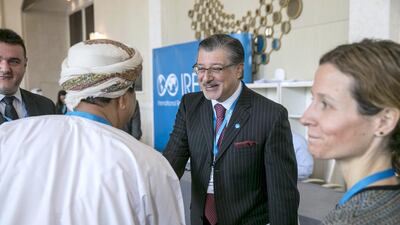The UAE has the potential to increase its renewable energy generation, saving US$2 billion a year by 2020, according to Adnan Amin, the International Renewable Energy Agency (Irena) director general.
Irena conducted studies in collaboration with several Emirati institutions that found the net result of savings in terms of costs from subsidies would actually give the UAE $2bn a year. “Clean energy for the UAE – especially Abu Dhabi – remains a priority,” he said.
His remarks come as Irena kicked off Abu Dhabi Sustainability Week yesterday with its fifth annual general assembly. Delegations spanning more than 151 countries gathered in the capital to discuss progress in renewable energy. Fourteen more countries have joined Irena since last year.
As part of Abu Dhabi’s sustainability week, the World Future Energy Summit begins at the Abu Dhabi National Exhibition Centre tomorrow. Organisers expect more than 30,000 policymakers and business leaders from 170 countries. Companies will showcase technological advancements. Conference sessions will cover project finance, research and development, growth markets and more.
According to a country report to be released next month, renewables will make up more than 10 per cent of the UAE’s power generation by 2030.
The UAE does not have a target for renewable energy implementation, but its two main cities have released figures supporting their renewable ambitions. Abu Dhabi has stated that it will reach 7 per cent renewable generation by 2020, and Dubai has earmarked 5 per cent by 2030.
One of the main reasons that the UAE is trying to diversify its electricity generation is because the main power feedstock is heavily subsidised, meaning the government pays for part of the total cost so the customer is able to get the product – such as natural gas – at cheaper rates. Mr Amin said that the subsidising of energy consumption in the UAE equals a revenue loss.
Suhail Al Mazrouei, the Minister of Energy, said that the government was taking steps to become less dependent on fuel subsidies, but the first part was to increase efficiency rates. “We are working very hard on the management demand side, improving efficiency of plants and distribution,” the minister said at a Gulf Intelligence forum in Abu Dhabi last week.
Mr Al Mazrouei added that further measures had been taken such as implementing green building standards and even going into a few residential areas to install energy-efficient products.
By diversifying the energy mix, the fuel used to generate power in the UAE could be exported to other countries to make a profit. Oil could be sold, depending on the day, for far more money. If the UAE is taking one barrel of oil for its own purposes at $7, at the current oil prices, the UAE loses out on $43 for each barrel it could have exported to places such as South Korea.
Mr Amin said that by using indigenous resources in a cost-effective way for power generation, the country can use its hydrocarbons for higher value products like petrochemicals. “It’s optimising economic use of resources, and it makes sense that the UAE would ramp up investment in clean energy,” he said.
The plus side about renewable energy today is that with financial mechanisms evolving for the field, renewable energy prices have become more cost competitive with conventional forms of power generation like natural gas, coal and diesel.
And Mr Amin noted that the UAE was one of the most interesting places, particularly after bids for Dubai Electricity and Water Authority's Mohammed bin Rashid Al Maktoum 100- megawatt solar park.
The winning bid came in below 6 US cents, which is below the current price for gas at 9 cents. Mr Amin said that with new gas exploration coming online, the prices could rise up to 13 cents.
Although more gas would be generated with these new developments, it will not be cheaper since the UAE has a high amount of sour gas.
Sour gas means that a high amount of hydrogen sulfide can be found, which makes the hydrocarbon very expensive to process so that it can be used in various applications. The director general said the costs of renewable energy developments like solar have become equal to gas in many cases.
The improvements that the UAE has made, particularly as an oil producer, provide an example for others. “We are very impressed at what Abu Dhabi and Dubai are doing,” said the Irena head.
lgraves@thenational.ae
Follow The National's Business section on Twitter

